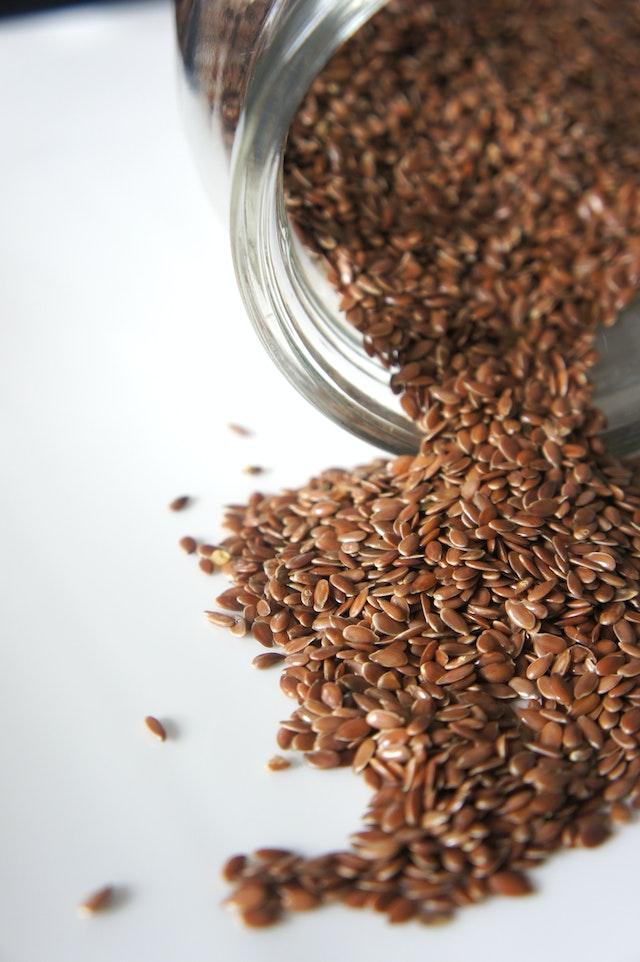
Flax Seed Oil Benefits for Diabetics
Is Flaxseed Oil Good for Diabetics?
Flax seeds and flaxseed oil may improve your blood sugar control, and insulin sensitivity and reduce the risk factors for heart disease. This is because they are rich in unique plant compounds, fiber, omega-3 fatty acids, and many more.
People with diabetes may gain a lot by using flax seeds and flaxseed oil since they have multiple health benefits that are essential in managing the condition.
Diabetes is one of the conditions that affect so many people globally in the modern day. In the United States alone, there are approximately 30 million people with diabetes and more than twice the number with prediabetes. It is worrying since these numbers are constantly on the rise.
The potential to lower blood sugar levels and delay the development of type 2 diabetes are some of the multiple health-promoting compounds found in flax seeds and flaxseed oil.
This article reviews the benefits and downsides of eating flax seeds and flaxseed oil if you have diabetes.
Your lipid profile and reduced blood sugar levels can be improved by the consumption of flaxseed. Flax seeds have the potential to slow down the absorption of carbohydrates in the body.
This was tested when people with type 2 diabetes and prediabetes maintained healthy blood sugar levels after taking a flaxseed supplement daily for 12 weeks.
Additionally, high blood sugar levels are caused by insulin resistance, and since flaxseed is effective in lowering insulin sensitivity, using it will help in lowering insulin resistance in your body.
Flaxseed Nutrition
One of the world’s oldest crops is flax seeds (Linum usitatissimum). Since about 3000 B.C., flax seeds have been cultivated for use in both the food and textile industries. The seeds are exceptionally nutritious and include roughly 45% oil, 35% carbohydrates, and 20% protein.
In every 10 grams or a tablespoon of whole flax seeds packs, you will find the following:

• Calories: 55
• Carbs: 6 grams
• Fiber: 2.8 grams
• Protein: 1.8 grams
• Fat: 4 grams
• Omega-3 fatty acid: 2.4 grams
Omega-3 fatty acid alpha-linolenic acid (ALA) is an essential fatty acid that your body cannot produce and the only way to obtain it is by consuming it in food.
One of the best sources that you can get Omega-3 fatty acid alpha-linolenic acid (ALA) is flax seeds. Additionally, to provide an excellent omega-6 to omega-3 ratio of 0.3 to 1, flax seeds and flaxseed oil have enough omega-6 fatty acids.
Fiber, both the soluble and insoluble kinds are the majority carb content found in flaxseed oil and flax seeds. When combined with water, soluble fiber forms a viscous mass that aids in controlling blood sugar levels.
Insoluble fiber, on the other hand, operates by increasing fecal volume and preventing constipation because it is not soluble in water. Lastly, comparable to that soybean, there is a significant amount of digestible high-quality protein, and amino acid profile contained in flax seed.
Difference Between Flax Seeds and Flaxseed Oil
Solvent extraction or pressing dried flax seeds is the process used in extracting flaxseed oil. Because of this, there is no fiber present in flaxseed oil.
Additionally, there are no protein and carb contents in flaxseed oil because after the extraction process from dried flax seeds oil pure fat content remains.
For instance, there are 0 grams of proteins and carbs in 1 tablespoon (15 ml) of flaxseed oil whereas the fat content is 14 grams. However, there are 3 grams of carb, 1.8 grams of protein, and 4 grams of fat in the same quantity of whole flax seeds.
However, flaxseed oil delivers a higher amount of ALA than flax seeds because of its higher fat content.
Benefits Of Eating Flax Seeds and Flaxseed Oil If You Have Diabetes
• Because they may improve many diabetes risk factors, both flaxseed oil and flax seeds have proved to have positive effects on this condition.
• Blood sugar control can be promoted by the use of flax seeds.
• The fiber in flax seed plays an essential role in maintaining healthy blood sugar levels, which is crucial for people with diabetes. Flax seeds are considered a low-glycemic food because of their high fiber content.
Therefore, consuming flax seeds will promote your blood sugar control. Food digestion in your body gets slowed and the rate of absorption of nutrients like sugar in your body decreases. This is caused by mucilage, a soluble fiber content in flax seeds.
Compared with the control group in one 4-week study, 29 people with type 2 diabetes found that consuming 10 grams of flaxseed powder each day reduced fasting blood sugar by up to 19.7%.
Compared with a control group in a 3-month study, 120 with type 2 diabetes who consumed 5 grams of flaxseed gum daily on their food experienced a fasting blood sugar reduction of up to 12%. Moreover, there were similar results observed in people with prediabetes who consumed two tablespoons (13grams) of ground flax seed daily in a 12-week study.
Flaxseed oil cannot benefit blood sugar control despite research showing that flax seeds seem to benefit blood sugar regulation.
• A hormone that regulates blood sugar is known as insulin. The sensitivity of insulin in your body can be improved by using flaxseed oil and flax seeds.
Your body requires greater amounts of insulin to lower your blood sugar levels if it has difficulties responding to insulin. This is a risk factor for type 2 diabetes, and it is known as insulin resistance.
How sensitive your body is to insulin is the meaning of insulin sensitivity and preventing and treating type 2 diabetes depends on improving it in your body.
• A powerful antioxidant known as lignan is available in high quantities in flax seed and they are responsible for slowing the development of diabetes and improving insulin sensitivity.
Secoisolariciresinol diglucoside (SDG) is very predominant in lignans found in flax seeds. SDG has the potential to improve insulin sensitivity and delay the development of both type 1 and 2 di8abetes as per the results from studies in animals.
However, further research is needed since human studies have not been able to confirm this effect.
Insulin sensitivity in both animals and humans has been linked to ALA from flaxseed oil, on the other hand. In fact, an increase in insulin sensitivity was observed in 16 people with obesity after they received a daily oral dose of ALA in supplement form in one 8-week study.
It was found that supplementing with flaxseed oil improved insulin sensitivity in a dose-dependent manner as per the studies in rats with insulin resistance. This means that the greater the improvement depends on how larger the dosage is.
• May reduce your risk of heart disease. Both flax seeds and flaxseed oil have been shown to help against conditions where diabetes is their risk factor for multiple reasons. Some of the diabetes risk factors include heart disease and stroke and some of the reasons that both flaxseed oil and flax seeds help protect against them are because of their content such as fiber, ALA, and SDG.
Cholesterol-lowering properties are found in flax seeds in soluble fibers such as the mucilage gum. Cholesterol absorption in your body reduces because of the soluble fibers in flax seed such as mucilage’s ability to form a gel-like substance that affects metabolism.
For example, compared with the control group in one 7-day study in 17 people who used flax seed fiber, their total cholesterol was lowered by 12% and LDL (bad) cholesterol was lowered by 15%.
Further, lignan SDG found in flax seeds acts as both an antioxidant and a plant-based compound that imitates the hormone estrogen known as phytoestrogen. Phytoestrogens are essential in reducing blood pressure in your body, while the antioxidant properties help in lowering cholesterol.
Compared with the control in one 12-week study in 30 men with high blood cholesterol levels, it was determined that those who received 100 mg of SDG experienced a decrease in LDL (bad) cholesterol levels.
• Omega-3 fatty acid ALA has potent anti-inflammatory effects. One of the risk factors for stroke is clogged arteries.
It was found that the anti-inflammatory effects in flaxseed and flax seeds may help regress or even in treating clogged arteries. There were promising results when participants with high blood pressure consumed about 4 tablespoons (30 grams) of milled flax seeds every day.
Compared with the control group, a reduction of 10-15 mm Hg and 7 mm Hg in systolic and diastolic blood pressure (the top and bottom numbers of the reading) respectively was observed.
People Who Should Not Use Flaxseed Oil
There are certain people that should not use flaxseed oil, and they include: –
• Pregnant women. Increased risk for premature birth and other adverse effects may be experienced when you use flaxseed oil during pregnancy.
• Children. Despite it being likely safe for children to consume small amounts of flaxseed, there has not been credible evidence on the safety of flaxseed oil when they consume it.
• Breastfeeding mothers. When it comes to consuming flaxseed oil for breastfeeding mothers, there is a lack of reliable information about its safety.
• People with bleeding disorders. Whether flaxseed oil may increase the risk of bleeding is a debate that has been there. However, it is advisable that you talk to your healthcare provider before using flaxseed oil in food, in supplement form, or as a topical treatment if you have a bleeding disorder.
• Surgery. To prevent bleeding, it is advisable that at least two weeks before surgery and throughout the initial recovery period, you should stop using flaxseed oil.
• People taking blood clotting drugs. There may be an increased risk of bleeding and bruising if you are taking flaxseed oil with medications that slow down blood clottings, such as warfarin, diclofenac, or aspirin.
Before adding flax seeds or flaxseed oil to your daily routine, it is advisable that you consult with your healthcare provider.
The bottom line
People with diabetes may get help from the multiple health benefits of flaxseed oil and flax seeds in managing the condition.
Reduced risk factors for heart disease, improved blood sugar control and insulin sensitivity are some of the multiple health befits found in flax seeds and flaxseed oil since they are rich in fiber, omega-3 fatty acids, and unique plant compounds.
However, using either flaxseed oil or flax seed may interact with other medications prescribed for the treatment of diabetes and therefore you should be mindful before consuming them.
FAQ:
Is Flaxseed Good for Lowering Blood Sugar?
Indeed, apart from playing a role in the prevention of prostate cancer, consuming flaxseed may aid in lowering your blood sugar levels.
Who Should Not Take Flaxseed Oil?
If you are using certain medications, have a preexisting medical condition, or take the wrong dosage it may cause undesirable side effects.
Therefore, before relying on flaxseed oil to boost your omega-3 fatty acid levels to ensure you are using the supplement safely it is advisable to consult your doctor.
Is It Safe to Take Flaxseed Oil Every Day?
Flaxseed oil is probably safe for most individuals to consume when taken orally. You can safely use flaxseed oil daily for up to 6 months if they are supplements containing 2 grams.
Flaxseed oil supplements comprising 2 grams per day can be taken safely for up to 6 months. Additionally, higher dosages of up to 24 grams per day have been taken without incident for up to 7 weeks. Loose stools and diarrhea are some of the side effects you may experience when you take flaxseed oil in large doses.
Will Flaxseed Lower A1c?
Participants with type 2 diabetes, who took flaxseed lignans for 12 weeks, saw an improvement in hemoglobin A1c, according to a study published in the journal Plos One.
Your blood sugar levels may reduce significantly when you take about 10-20 grams of flaxseed powder daily as claimed in some studies.
Does Flaxseed Oil Affect Kidneys?
In conclusion, a decline in renal function and reduced glomerular injury with favorable effects on blood pressure, plasma lipids, and urinary prostaglandins may be experienced with dietary flax seed consumption.
When Is the Best Time to Take Flaxseed Oil?
Overall, for optimal health, it is advisable taking flaxseed capsules in the morning to provide your body with necessary and essential nutrients.
Additionally, to keep the bowels moving regularly and to prevent digestive issues it is best to take flaxseed oil in the morning.
Does Flaxseed Interfere with Metformin?
Between flaxseed and metformin, there have been no interactions found.
Is Flaxseed Good for Insulin Resistance?
Flaxseed supplementation decreased insulin resistance, according to the findings from a recent study. An HOMA-IR index significantly decreased despite the plasma insulin concentration not changing significantly.
Therefore, this suggests following flaxseed supplementation there was a decrease in insulin resistance or decreased glucose concentration.
Which Is Better, Flaxseed or Flaxseed Oil?
The provision of much more ‘essential’ fatty acids per serving is the major advantage of flaxseed oil over ground seeds.
The ‘essential’ fatty acids are healthy fatty acids that your body cannot make and therefore you need to take them through a diet.
Does Flaxseed Oil Increase Creatinine?
The serum and kidney creatinine levels in several pathological and experimental conditions have been lowered by the use of flaxseed oil or flaxseed diets. Renin mRNA levels in SHR 37 have been shown to be inhibited by flaxseed oil.
Does Flaxseed Oil Affect Blood Pressure?
Lower risk of developing high blood pressure has been linked with a higher intake of flaxseed oil as per the result shown in the population research.
Additionally, blood pressure in men with high cholesterol and normal blood pressure can be lowered by taking flaxseed oil supplements, according to suggestions from early research.
Is Flaxseed Oil Anti-Inflammatory?
There are anti-inflammatory properties in a-linolenic n-3 fatty acid (ALA), which is abundant in flaxseed oil (FO)
Does Flaxseed Oil Help You Sleep?
One of the natural mood lifters is omega-3 fatty acids and they are abundant in flaxseed oil. To promote a night of deeper sleep, it was noticed that many people took just 1 tablespoon of flaxseed oil one hour before bed. In initiating and maintaining sleep, generally, fatty acids are involved.
Before using flaxseed oil and to ensure that it is appropriate for you, it is advisable that you speak with your healthcare provider.


